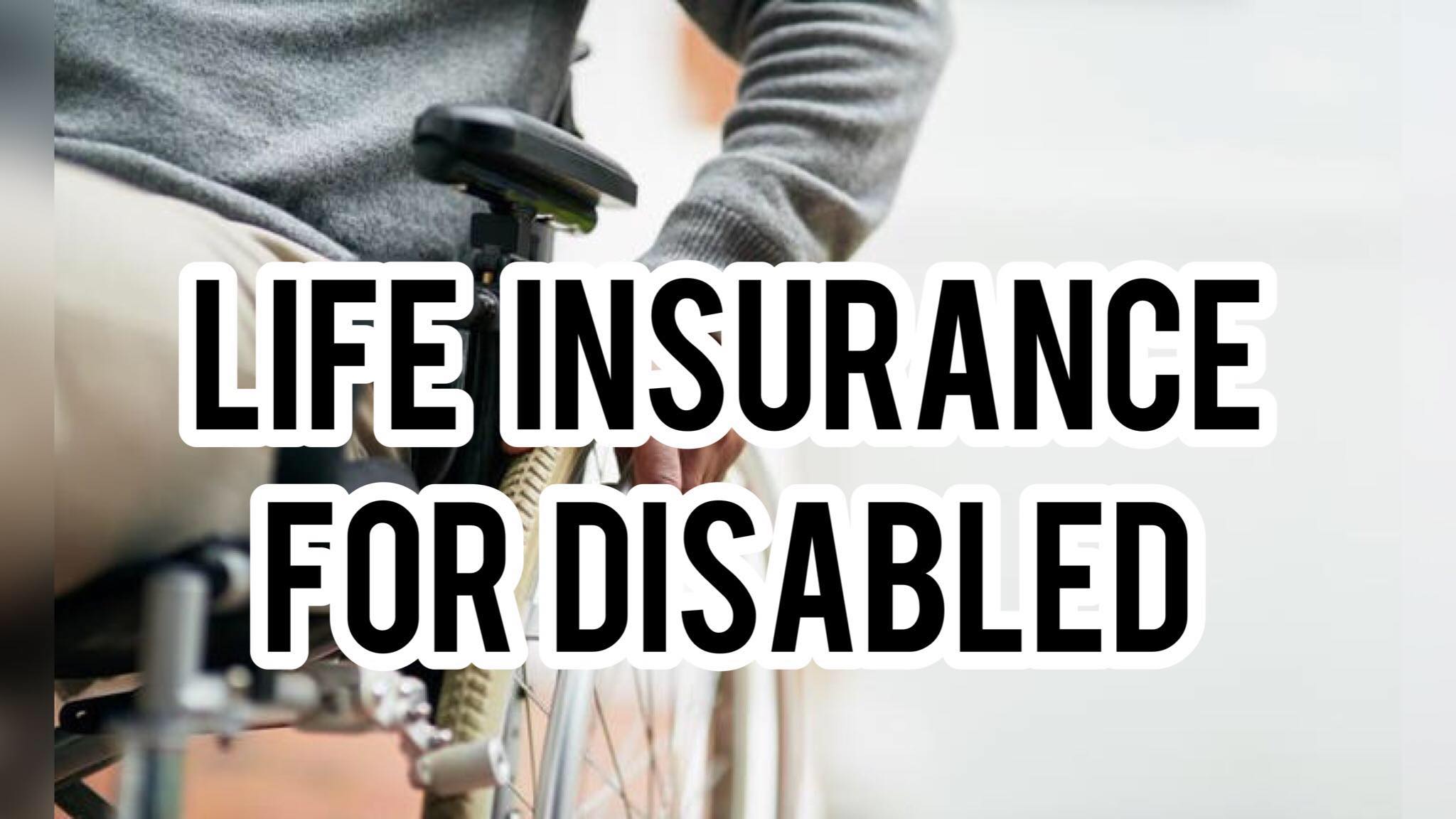Life Insurance for the Disabled: In exchange for the premiums paid by the policyholder during their lifetime, life insurance guarantees an amount of money to be paid to designated beneficiaries when the insured passes away. Given that almost a quarter of American individuals have a handicap and require insurance, there are several solutions available in this market.
The main goal of life insurance is to make sure that one’s loved ones are taken care of after death, whether it is to pay off debt, cover funeral costs, or leave a nest egg for beneficiaries. People with impairments may find it difficult to get life insurance, although being disabled does not automatically prevent one from doing so.
Like any insurance policy, the more risky the situation, the more expensive it will be: the more serious the handicap, the more expensive the premiums and the fewer options available. Insurance firms use the following considerations when deciding whether to underwrite a policy, which involves evaluating the risk and the insurability of the individual:
The Type of Disabilities
Loss of hearing or vision, for example, has no impact on life expectancy. A handicap or chronic disease, however, may make it more difficult (and more expensive) to obtain life insurance, depending on the kind of impairment, how effectively it is treated, and its expected influence on the insured’s lifetime.
Medical Treatments and Medical History
A life insurance provider will take into consideration your current and previous medical treatments, prescription drugs, surgeries, and hospital stays. Interviews, a questionnaire, and a check of the applicant’s medical file and prescription records are used to collect this data.
Also Read: Auto Insurance: Best Review In 2023
Employment
The applicant will have an advantage if they are employed. Consistent work is viewed by life insurance companies as a sign of overall health. Regular job entails regular salary, which will demonstrate the applicant’s capacity for timely payments.
Habits and Hobbies
Smoking, drinking, using marijuana recreationally, and other dangerous behaviors will all have an impact on a candidate’s ability to obtain life insurance as well as the price of their premium. Numerous life insurance plans (although not all of them) need blood and urine testing.
The Plans
The two primary forms of life insurance plans are term life insurance and permanent life insurance. There are several life insurance options to suit a wide range of requirements and tastes. The main decision is whether to choose temporary or permanent life insurance depending on the short- or long-term needs of the individual to be protected.
A medical exam is not necessary for guaranteed-issue whole life insurance, which makes it more widely available despite its higher cost and death benefit cap. Paying for ultimate medical expenditures, burial fees, and other associated costs may be beneficial. A policy with impaired risk is typically a better option for those whose high-risk impairments are reducing their life expectancy.
Understanding Insurance Riders
Despite not being tailored specifically for those with impairments, insurance riders provide flexibility that may be quite helpful to the disabled. Insurance riders provide customers the flexibility to tailor their insurance coverage to their own requirements. While certain riders can be added later, others must be introduced when the policy is first implemented. To name a few:
Chronic Illness Riders
When a policyholder is still alive but unable to do at least two of the six recognized activities of daily living—eating, bathing, getting clothed, using the toilet, transferring, and continence—chronic sickness riders pay payments.
Also Read: Best Homeowners Insurance Review 2023
Child Rider
Many life insurance plans provide plans that cover both the parent and the kid. It may be possible for the parent of a kid with a handicap to add their child to their coverage. The exact conditions of kid riders differ widely in terms of the duration of the child’s coverage, any potential health limits, whether a medical checkup is necessary, and other elements.
Most child riders are written to expire as the kids grow up. The rider may then be changed into a permanent life insurance policy in particular circumstances at that time. The conditions and expenses will change based on the rider’s terms, the child’s health, and other elements.
Accelerated Benefit Riders
These options for term life insurance allow the insured, whether or not they are handicapped, to use a portion of the death benefit prior to their passing. This is particularly helpful for paying for medical expenditures and other acceptable end-of-life costs like employing a home health aide or paying for hospice or nursing home care.
Different riders provide coverage for various situations. Riders for terminal diseases compensate for costs associated with incurable illnesses and provide policyholders access to a portion of the payment in the event of a qualified critical illness diagnosis.
The Procedure
Insurance underwriters will review written medical records, do a physical examination, and test blood and urine in addition to measuring weight, blood pressure, and heart rate. The medical examination cannot, by law, be distinct from the medical examination the insurer performs on those without disabilities.
The application for an insurance will either be accepted or accepted with conditions, such as a waiting time before the policy takes effect. This is done to stop people from purchasing life insurance while they are already terminally sick and have a limited amount of time left to live.
How Applicants Can Improve Their Case
Being denied by one insurance company can make it more difficult to be approved by other companies. Here are some steps applicants can take to boost their chances of being approved and, if approved, obtain lower premiums and better terms.
Check medical records
Applicants should ask their healthcare providers for copies of their medical records so they may check them for correctness. Perhaps a former medical condition has been handled and resolved. If so, the applicant may include a note with the application describing the situation.
Keep appointments
The more closely the applicant follows their treatment plans and planned visits if their handicap necessitates routine checks and prescribed drugs, the smaller the perceived risk of insuring them is. This is particularly true if the candidate suffers from a chronic illness like diabetes.
Consider working with an experienced agent
It might be beneficial to work with an insurance agent who has knowledge in serving customers with impairments. Such brokers can test the waters for their customers and are aware of which businesses create the finest plans for the disabled. In order to obtain the insurance company’s opinion on the client’s insurability, they can accomplish this by providing insurers with the client’s anonymized medical profile. A positive answer will influence the agent’s decision to proceed with a formal application.
Can People With Disabilities Buy Life Insurance?
Yes, most disabled individuals can get some kind of life insurance. The kind of impairment you have, the severity of your disease, and your general health are just a few of the variables that will affect your eligibility and rates. Disability may result in increased rates and fewer plan selections.
Are Physical Exams Always Required by Insurance Companies?
No. There are insurance options that don’t demand a physical. There are two life insurance policy options that don’t require a medical exam: simple issue and assured issue. Your coverage may be limited to a certain level or come with higher charges.
How Does a Medical Exam for Life Insurance Work?
Your insurance provider will cover the cost of your medical exams. A certified medical technician will visit you at home or at work to conduct the examination. You will also receive a copy of the outcomes. The examination typically lasts about 30 minutes.
How Can a Person with a Disability Choose the Best Life Insurance?
Learn as much as you can about the many life insurance options, such as those that don’t call for a medical exam, as well as the conditions that the insurance provider places on each policy. Make the best choice for you by educating yourself on the advantages of various policies and how they differ.
Conclusion
Life insurance is crucial for someone’s financial security. The life insurance alternatives available to handicapped people have significantly increased in recent years, and the insurance industry has also demonstrated considerably greater flexibility in structuring policies than in the past. Research is important for every financial choice, as well. Some life insurance providers provide special plans for clients with conditions including autism, Down syndrome, or cerebral palsy.

Sage is a financial/consumer journalist and senior editor, personal finance, of TrendsHQ. EXPERTISE: Personal Finance, Careers, Jobs, Scholarships, and Entertainment.
